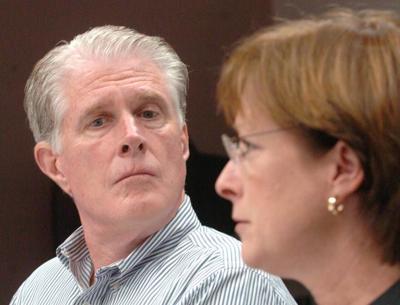MONTPELIER — A new television advertisement by Republican U.S. Senate candidate Richard Tarrant violates federal law by not correctly identifying who paid for it, his opponent, Independent U.S. Rep. Bernard Sanders, alleged Thursday. A recent TV ad by Tarrant's campaign, attacking Sanders' record in Congress, included a required disclaimer that the spot was produced with the candidate's approval. However, the "I'm Rich Tarrant and I approved this message" notice appears at the beginning of the spot, rather than at the end. That alleged violation of Federal Communications Commission rules means Tarrant should not qualify for the reduced advertising rate, or "lowest unit charge," enjoyed by candidates for public office, according to lawyers for Sanders' campaign. "Tarrant has forfeited his entitlement to the lowest unit charge for the duration of the campaign," a letter Sanders' lawyers wrote to TV stations said. "Now and until election day, your station must charge Tarrant and his campaign committee the same rate for broadcast time that it charges nonpolitical advertisers for comparable use." Tarrant's lawyers quickly responded, saying the ads include all the information the government requires. "The disclaimers appearing in Tarrant's advertisements comply with the purpose of the LUC (lowest unit charge) rule. All Tarrant's television advertisements provide the required information to voters in spoken and written form … the voting public is not deprived of any information or notice as to who is responsible for the content of the advertisements." The placement within an ad of a candidate's disclaimer might seem to be a small detail, but in fact it is important, said Sanders Campaign Manager Jeff Weaver. "They have clearly violated the rules that require them to stand by their ads," Weaver said. "We all have to live by the same set of rules. Rich Tarrant doesn't get a separate set of rules. "Whether this costs him a dime or a million dollars doesn't matter to us. Ultimately this is not about money, it is about principle." Tim Lennon, Tarrant's campaign manager, said Sander's objection is rooted in what Lennon described as the congressman's fear of being held accountable for the votes he has cast. The ad, which focuses on a Sanders vote on Amber Alert legislation, is one of a series by Tarrant attacking Sanders' voting record. "It's calling on him to admit his bad vote and he clearly doesn't want to talk about it," Lennon said. "His record really hasn't been examined and he is running from his record." Weaver said the ads represent "dishonest and deceptive attacks" by Tarrant. Sanders' objection to the Tarrant ads mimics those raised in other congressional races this year, Lennon said. He said the same firm Sanders hired, Perkins Coie of Washington, D.C., has sent similar letters in other races. Weaver, Sanders' campaign manager, said, "Republicans all across the country are running negative attack ads. It's not surprising to me that as part of that, Republicans all across the country are trying to dodge the federal disclaimer requirements." Officials from the Federal Election Commission and the Federal Communications Commission declined to comment on the issue, saying the agencies may be called upon to adjudicate the claim. If either agency decides to investigate and finds Tarrant's campaign acted improperly, it could impose fines. Under FEC rules, a candidate's advertisement must include a statement by the candidate that the spot was produced with their approval. The FCC's rules go into greater detail. "A candidate meets the requirements of this subparagraph if, in the case of a television broadcast, at the end of such broadcast there appears simultaneously, for a period no less than 4 seconds" a clearly identifiable photograph of the candidate and a notice that the candidate approves the spot. If a candidate's ads violate those conditions, a TV or radio station may bill the campaign at rates that are higher than the lowest unit charge, according to the FCC. It might not make that much difference, because October's rates for federal candidates and for regularly purchased airtime are not that different, said Bruce Grindle, general sales manager for Burlington-based television station WCAX. "I don't think it makes a huge difference," he said. Grindle said the station sent a copy of the letter from Sanders' campaign to its attorney, "who is going to give us some advice about it." It is up to candidates, not TV stations, to make sure ads comply with federal rules, he added. Sanders' campaign had raised $4.38 million, and spent $3.38 million, as of late August, according to its most recent campaign finance report filing. The campaign run by Tarrant, co-founder of Burlington-based IDX Systems Corp., which was sold this year to GE Healthcare, reported raising $5.35 million, virtually all of it his own money, and spending about $4.9 million, most of it on television ads. Contact Louis Porter at louis.porter@rutlandherald.com.
Sanders faults Tarrant TV ad
- By LOUIS PORTER Vermont Press Bureau
- Updated


